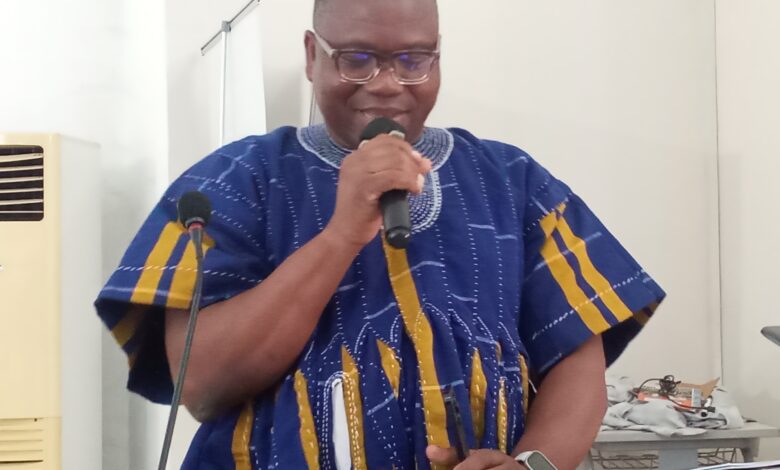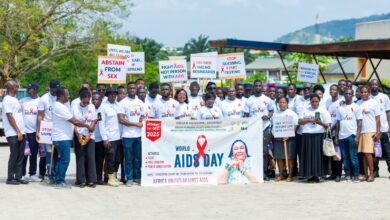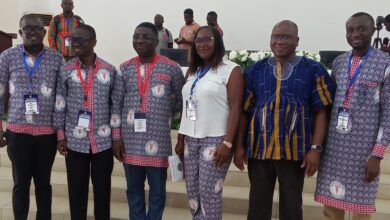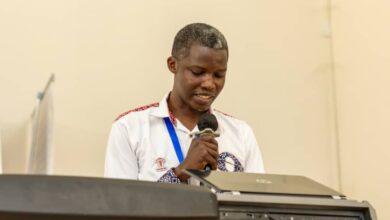Allied Health Council Reaffirms Support for Optometrists, Announces Reforms and Digitization Drive

The Registrar of the Allied Health Professions Council (AHPC), Dr. Shirazu Issahaku, has reaffirmed the Council’s strong partnership with the Ghana Optometric Association (GOA) and outlined several major reforms aimed at strengthening regulation, professional development, and digital transformation across the allied health sector.
Delivering a fraternal message to the distinguished members of the GOA during their 13th Annual General Meeting and Scientific Session held at the Kwame Nkrumah University of Science and Technology (KNUST) on Friday, October 17, Dr. Issahaku commended optometrists for their pioneering role in shaping the Council since its inception.
“Optometrists were not merely present at the formative stages — you were at the very forefront, providing visionary leadership, unwavering dedication, and the technical expertise necessary to shape the Council into the robust regulatory body it is today,” he said.
He praised the profession’s contributions to policy implementation, ethical practice, and the delivery of quality eye care services in Ghana, describing their work as a “critical pillar” of the nation’s healthcare system.
Theme and Assurance of Support
Dr. Issahaku lauded the theme of this year’s AGM — “Low Vision Rehabilitation: Breaking Barriers, Building Bridges” — as timely and relevant, adding that the Council fully supports the Association’s commitment to continuous professional development and innovation in clinical practice.
“This gathering is a testament to your commitment to continuous professional development, knowledge sharing, and the pursuit of excellence — principles that are at the very heart of our mandate at the Council,” he remarked.
Key Announcements and Reforms
The Registrar also used the occasion to announce several key initiatives being rolled out by the Council to enhance the regulation and efficiency of allied health practice in Ghana.
Dr. Issahaku revealed that the Council has introduced computer-based licensure examinations this year, harmonized curricula across all allied health training programmes, and established a well-resourced Professional Standing Committee to strengthen regulation. He added that the budget for the Ghana College of Allied Health Professions has been incorporated into the Council’s 2026 budget to pave the way for its establishment, while both the professional register and training institutions are undergoing comprehensive audits to enhance credibility and quality assurance. According to him, accreditation processes for allied health programmes are being reviewed, four compulsory Continuing Professional Development (CPD) modules have been introduced for professional associations, and the logbook and indexing systems have been fully digitized. He further noted that the Council is being restructured to include three new technical directorates—Education and Examination, Regulation and Compliance, and Policy, Planning, Research, Monitoring and Evaluation—alongside the Administration and Finance Directorate, to ensure operational efficiency and improve service delivery.
Strategic Priorities
Dr. Issahaku also outlined the Council’s six key strategic priorities, which include enhancing regulatory frameworks, improving licensing and accreditation, promoting public safety, advancing professional development, fostering stakeholder collaboration, and leveraging technology for efficiency.
He disclosed that efforts are underway to complete the Legislative Instrument (LI) to operationalize Part I of Act 857 (2013) and to secure a permanent office complex for the Council.
“Our goal is to build a dynamic, transparent, and technology-driven regulatory system that not only ensures professional accountability but also supports practitioners in delivering the highest standards of healthcare to Ghanaians,” Dr. Issahaku emphasized.






